Can Turtle Shells Heal? [Truths Revealed]
Can Turtle Shells Heal? Turtle shells have long been a subject of fascination and mystery. Beyond their role as protective armor for these gentle reptiles, there have been claims and beliefs surrounding the healing properties of turtle shells.
In this blog post, we delve into the age-old question: Can turtle shells heal? Join us as we explore the science, myths, and folklore surrounding this intriguing topic.
Can Turtle Shells Heal:
The History of Turtle Shell Healing:
Turtle shell healing is not a new concept. Throughout history, various cultures around the world have attributed mystical and medicinal properties to turtle shells.
In Chinese medicine, for example, turtle shells have been used for centuries to treat a variety of ailments, from inflammation to infertility.
Similarly, Native American tribes have incorporated turtle shells into their healing practices, believing in their ability to ward off evil spirits and promote physical well-being.
The Science Behind Turtle Shells:
While the mystical beliefs surrounding turtle shells are intriguing, what does science have to say about their healing properties? Turtle shells are composed of a tough outer layer made of keratin, the same protein found in human nails and hair.
While keratin does have some regenerative properties, there is limited scientific evidence to support the idea that turtle shells can heal physical injuries or illnesses in humans.
Folklore and Myths:
Despite the lack of scientific evidence, the belief in the healing power of turtle shells persists in many cultures. In Japanese folklore, turtles are seen as symbols of longevity and good luck, with their shells believed to bring protection and prosperity.
In African traditions, turtle shells are used in rituals and ceremonies to promote healing and spiritual growth. These myths and stories add to the mystique surrounding turtle shells and their perceived healing abilities.
Ethical Considerations:
While the idea of using turtle shells for healing purposes may seem appealing to some, it raises ethical concerns regarding animal welfare and conservation. Turtles are already facing threats from habitat loss, pollution, and overexploitation.
Harvesting turtles for their shells can further endanger these vulnerable species and disrupt fragile ecosystems. As responsible stewards of the environment, it is important to consider the impact of our actions on wildlife populations.
Alternative Healing Practices:
In the absence of scientific proof for the healing properties of turtle shells, it is worth exploring alternative healing practices that are backed by evidence-based research.
From acupuncture and herbal medicine to massage therapy and mindfulness techniques, numerous holistic approaches to health and wellness are effective.
By embracing these practices, we can support our well-being without relying on unproven or potentially harmful remedies.
Respecting Nature’s Wisdom:
While the allure of mystical cures and ancient remedies may be tempting, it is essential to approach them with a critical mind and a respect for nature’s wisdom. Turtles play a vital role in ecosystems as keystone species, helping to maintain balance and biodiversity.
By honoring and protecting these magnificent creatures, we can gain a deeper appreciation for the interconnectedness of all living beings and the importance of preserving our natural world.
Conclusion:
the idea of turtle shells possessing healing powers is steeped in history, folklore, and cultural significance. While there is no concrete scientific evidence to support their medicinal use, the symbolic value of turtle shells cannot be denied. By honoring the traditions and beliefs surrounding turtle shells, we can learn valuable lessons about the power of nature, the resilience of ancient wisdom, and the importance of ethical conduct in our quest for healing and wholeness.
